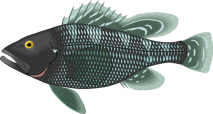|
Design Concepts Related Concepts Project Comparison Desalination Tunnel Boring Irrigation Fish Culture Project History April 12 Meeting |
|
Fish Culture
Marine Fish Culture in the Jordan Valley Water from the Mediterranean Sea that bypasses the desalination process can be utilized for marine fish production in the area where that water is kept separate from the Dead Sea. Construction of a rock fill barrier between the Dead Sea and the transport canal for the Med water will enable marine fish production in cages. Marine fish ponds can be developed utilizing the Med Sea water. The potential is for the Jordan Valley to become the world leader in the production of Sea Bass and Sea Bream. Med Sea water pumped by wind power into energy storage reservoirs on the mountains of Jordan can also be utilized for marine fish production. Reversible turbine pump-generators can provide the stored energy of wind power for use when it is needed, while fish production is supported with the stored water. In addition, fresh water from desalination can be stored in ponds for fresh water fish production, and that water then used for crop irrigation. Fish are the most economical converters of feed to meat, and offer great promise for improving the diet of the people of the region.
As in many parts of the world, aquaculture production in the Mediterranean has been expanding
rapidly over recent years. Total aquaculture production in the region reached 1,266,959 t in
1999, which represents approximately 6% of the world aquaculture production (3% in 1995).
Review of the marine fish farming development in Greece  Ardag Ltd., located on the northern shore of the Gulf of Aqaba, is Israel's largest and most experienced mariculture company. A cooperative business, owned and operated by five kibbutzim in the southern Arava valley, Ardag today operates three main facilities: http://www.ardag.co.il/index.html
|
 Recently, Akvaplan-niva undertook a full feasibility study for sea bream (Sparus aurata)
production in the Sultanate of Oman. Based on this study the first aquaculture license for the
commercial culture of sea bream has been granted and we are presently preparing the design,
specification of equipment and construction drawings. The project will be fully integrated with
hatchery, offshore cages and packaging/ processing plant. It will be one of the largest fish
farms in the Arabian Gulf region.
Recently, Akvaplan-niva undertook a full feasibility study for sea bream (Sparus aurata)
production in the Sultanate of Oman. Based on this study the first aquaculture license for the
commercial culture of sea bream has been granted and we are presently preparing the design,
specification of equipment and construction drawings. The project will be fully integrated with
hatchery, offshore cages and packaging/ processing plant. It will be one of the largest fish
farms in the Arabian Gulf region.